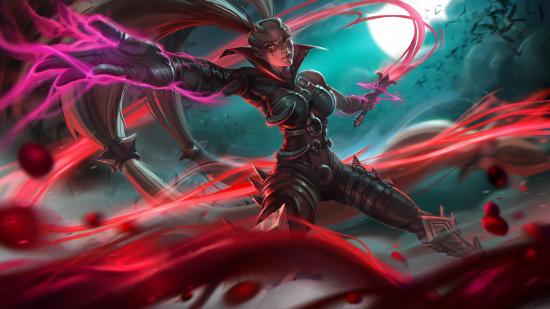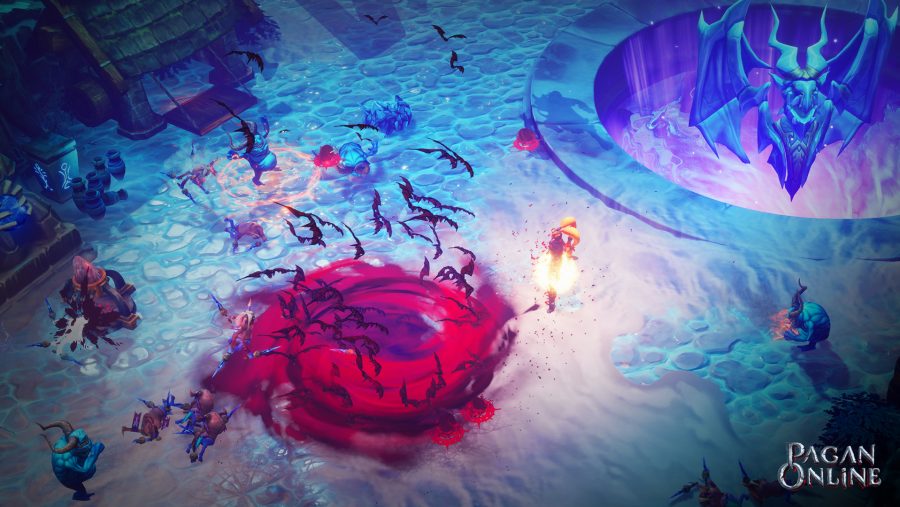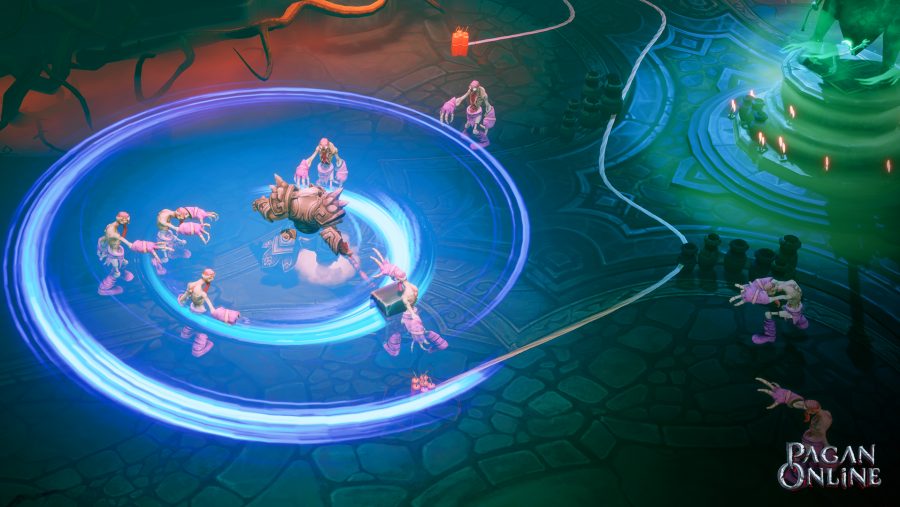When you look at the history of a successful videogame studio, you can usually see the progression of ideas that steadily marched it to where it is today. There’s always a seismic breakthrough at some point, far overshadowing the studio’s previous achievements – Blizzard had Diablo, whereas Rockstar made GTA III off the back of Body Harvest – but the path that took these studios to the top is, in hindsight, pretty clear.
What’s not so common is when a developer of casual games gets taken on by a publishing juggernaut to make a vast, game-as-a-service RPG looking to rub shoulders with hits like Diablo and Path of Exile. Yet that’s what Serbian developer Mad Head Games, best known for an obscure but well-rated repertoire of Hidden Object games on Steam, has been tasked with.
With World of Tanks’ Wargaming as publisher, Mad Head has been set to work on Pagan Online, a dungeon crawler with a pacey twist. We spoke with the game’s publishing director Yaropolk Rash about how Wargaming joined forces with Mad Head Games, Pagan Online’s Slavic-inspired theme, and why it isn’t taking the free-to-play route like so many games of its kind.
PCGN: How did Mad Head Games convince you that it was up to a big job like this?
Yaropolk Rash: Our partners at Epic Games always have someone trying to develop a game using Unreal Engine, and they highlighted some of the teams working with them. Mad Head Games was one of them. So we approached them, because we were impressed with the combat demo they made.
Read more: Point your sword at the best RPGs on PC
There were months of getting to know each other, during which time we learned that Mad Head Games are thinking about players first, are passionate about what they do, and know how to make high-quality games. This, and the fact that we were very impressed by the demo, made up our mind.
The theme of pre-Christian and Pagan gods is pretty uncommon. What made you go with it?
Some of the bosses – the hardest versions – will literally be based on gods from Slavic mythology, because Mad Head is a Serbian studio and wanted to highlight its roots. We’ll have Velus, god of the Underworld, and there’s a lot of talk about Triglav – a Slavic god with three heads. Obviously you’ll have your dragons, your undead kings, your guys with massive wings too. We wanted to have all the fun stuff people are used to from fantasy worlds, but nicely seasoned with inspirations from certain cultures which will make you feel a little bit closer to the characters.
The free-to-play model worked so well for Wargaming with World of Tanks, as well as similar ARPGs like Path of Exile. What made you decide to sell this as a premium game instead?
The easiest thing here is to ask your audience. For us, even just a couple of months ago we were asking the question, ‘Do you think it’s feasible to sell a F2P game to a bunch of old-school people who played Diablo?’. We thought it didn’t seem like a very good idea. Then we had certain events in the industry that kind of said to us, ‘Yeah, we were right. It wasn’t a good idea to do that’.
Sounds intriguing. What ‘events’ are you referring to?
We don’t want to specify, but from time to time you see examples of games sacrificing players’ experiences in favour of studios’ or publishers’ beliefs. We know exactly who we are making Pagan Online for, and we know their expectations, preferences, and attitudes. So going premium was not a ‘religious’ or corporate decision, it was a decision in favour of players.
You mentioned Diablo before. It’s interesting how after all these years it still dictates conversations about this type of game.
There are certain expectations from players. We understand that Diablo is a major player on the market and people are looking for more of that. It’s a genre-defining game – with all respect to Torchlight, which I am the biggest fan of, and Path of Exile which is doing great work. We want Pagan to keep those people engaged for a long time… maybe while they’re waiting for the next Diablo? Who knows!
You mentioned in your presentation that you wanted to attract ‘frustrated’ gamers. Do you mean people frustrated with free-to-play models? Those looking for a more traditional way to play their games?
It’s not about tradition. It’s about being fair. Wargaming is known for fair F2P models, but it’s a barrier from the very beginning. You don’t want to spend time and resources telling people, ‘We’re not like that, we have a history of being fair and our whole thing is free-to-win rather to pay-to-win’. We don’t want to have those conversations in the first place, because we want to focus on the experience.
And how will you keep people ‘focused on the experience’?
We want Pagan to go for a long time with the help of Battle Chapters we plan to launch quarterly, which will offer new sections of the story, new characters, new zones, new bosses. If you don’t want to buy those DLCs, we still have a core product that people can enjoy, and a storyline which will go to all those places, but you’ll just be locked off from those new characters and modes that are specifically exclusive to those Battle Chapters. It’s not a paywall or anything like that. You can skip two and buy the fourth one.
Beyond the Battle Chapters, will there be other monetisation?
We’re looking closely into cosmetic items like character skins, emotes, and pets, clarifying their value for the players as well as how to make them accessible. We will be sharing updates on this when we make the decisions. The thing that will not change is that there will be no way to buy better gear, more powerful characters, or otherwise influence your performance with cash.
We’ve seen online RPGs like Path of Exile and Elder Scrolls Online go through dramatic changes to gameplay and monetisation before becoming successful. How flexible will Pagan Online be to change if it doesn’t hit the ground running?
That’s very much the reality of modern online games, and this becomes even more interesting when you have a premium game. This is why we had ‘The Trials’ testing period before launch, and will be updating the game with the Battle Chapters expansions after launch. This will give us the opportunity to listen to our players and react accordingly, and to make sure that the delivery of this game is just right.


